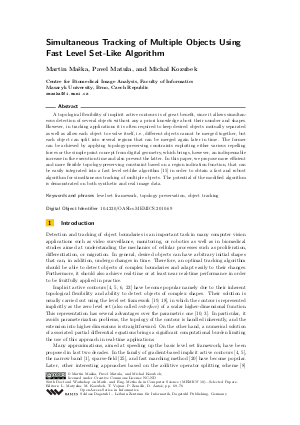Simultaneous Tracking of Multiple Objects Using Fast Level Set-Like Algorithm
Authors Martin Maska, Pavel Matula, Michal Kozubek
-
Part of:
Volume:
Sixth Doctoral Workshop on Mathematical and Engineering Methods in Computer Science (MEMICS'10) -- Selected Papers (MEMICS 2010)
Part of: Series: Open Access Series in Informatics (OASIcs) - License:
 Creative Commons Attribution-NonCommercial-NoDerivs 3.0 Unported license
Creative Commons Attribution-NonCommercial-NoDerivs 3.0 Unported license
- Publication Date: 2011-03-11
File

PDF
OASIcs.MEMICS.2010.69.pdf
- Filesize: 4.61 MB
- 8 pages
Document Identifiers
Subject Classification
Keywords
- level set framework
- topology preservation
- object tracking
Metrics
- Access Statistics
-
Total Accesses (updated on a weekly basis)
0PDF Downloads0Metadata Views
Abstract
A topological flexibility of implicit active contours is of great benefit, since it allows simultaneous detection of several objects without any a priori knowledge about their number and shapes. However, in tracking applications it is often required to keep desired objects mutually separated as well as allow each object to evolve itself, i.e., different objects cannot be merged together, but each object can split into several regions that can be merged again later in time. The former can be achieved by applying topology-preserving constraints exploiting either various repelling forces or the simple point concept from digital geometry, which brings, however, an indispensable increase in the execution time and also prevent the latter. In this paper, we propose more efficient and more flexible topology-preserving constraint based on a region indication function, that can be easily integrated into a fast level set-like algorithm [Maska, Matula, Danek, Kozubek, LNCS 6455, 2010] in order to obtain a fast and robust algorithm for simultaneous tracking of multiple objects. The potential of the modified algorithm is demonstrated on both synthetic and real image data.
Cite As Get BibTex
Martin Maska, Pavel Matula, and Michal Kozubek. Simultaneous Tracking of Multiple Objects Using Fast Level Set-Like Algorithm. In Sixth Doctoral Workshop on Mathematical and Engineering Methods in Computer Science (MEMICS'10) -- Selected Papers. Open Access Series in Informatics (OASIcs), Volume 16, pp. 69-76, Schloss Dagstuhl – Leibniz-Zentrum für Informatik (2011)
https://doi.org/10.4230/OASIcs.MEMICS.2010.69
BibTex
@InProceedings{maska_et_al:OASIcs.MEMICS.2010.69,
author = {Maska, Martin and Matula, Pavel and Kozubek, Michal},
title = {{Simultaneous Tracking of Multiple Objects Using Fast Level Set-Like Algorithm}},
booktitle = {Sixth Doctoral Workshop on Mathematical and Engineering Methods in Computer Science (MEMICS'10) -- Selected Papers},
pages = {69--76},
series = {Open Access Series in Informatics (OASIcs)},
ISBN = {978-3-939897-22-4},
ISSN = {2190-6807},
year = {2011},
volume = {16},
editor = {Matyska, Ludek and Kozubek, Michal and Vojnar, Tomas and Zemcik, Pavel and Antos, David},
publisher = {Schloss Dagstuhl -- Leibniz-Zentrum f{\"u}r Informatik},
address = {Dagstuhl, Germany},
URL = {https://drops.dagstuhl.de/entities/document/10.4230/OASIcs.MEMICS.2010.69},
URN = {urn:nbn:de:0030-drops-30625},
doi = {10.4230/OASIcs.MEMICS.2010.69},
annote = {Keywords: level set framework, topology preservation, object tracking}
}
